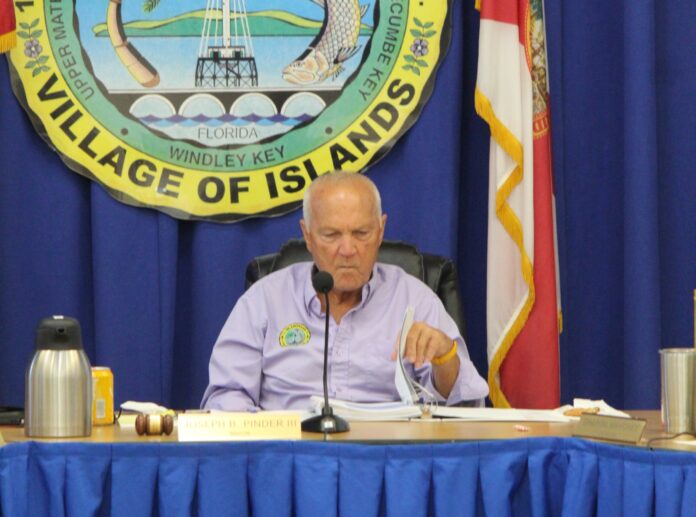Three days of budget workshops concluded Aug. 23 with at least three Islamorada council members expressing their desire to provide a bit of tax relief to village property owners, all while funding government operations and project requests in various departments.
Discussions over a proposed spending plan began Aug. 21 as the five council members, department heads and community members convened at the Founders Park Community Center. Talks ended with Mayor Buddy Pinder, Vice Mayor Sharon Mahoney and Councilman Henry Rosenthal verbally agreeing to direct staff to create an initial budget proposal which levies $16.7 million in property taxes for village operations. It would provide a decrease of roughly $194 on a $1.3 million median home in the village.
But the village would still rake in more than $1 million in property tax dollars above last year’s approved spending plan that levied $15.7 million for day-to-day government operations. That’s due to the village’s taxable value increasing by nearly $730 million in the course of a year to $6.5 billion in 2024.
Council members were presented with various budget scenarios, including one that proposed to levy $18.9 million in property tax dollars. Based on a $1.3 million median home in the village, the property owner would face a $262 increase in their tax bill. Mahoney, Pinder and Rosenthal believed the village taxpayers needed some relief.
“I think the people in this town need a break,” Mahoney said.
The proposed spending plan included a 5% cost of living adjustment for nonunion personnel. Village Manager Rob Cole said he’s looking to implement a performance evaluation system where employees receive a base increase plus additional dollars for meeting certain goals within a fiscal year. Cole said the system should be in place for the next fiscal year.
Councilwoman Elizabeth Jolin sought additional funds in the budget to address workforce housing needs in the village. Nothing in the budget addressed any village-directed housing projects. Lengthy council discussion yielded no funding allocation for the cause.
“We’re not prioritizing funding for workforce housing because we (the council) just don’t prioritize it,” Jolin said. “We have lots of early out allocations. We have lots of resources to pull from. It could be anything from village-purchased land that we build on and create housing. It could be anything.”
Jennifer DeBoisbriand, planning director, said her staff is developing a plan to address the workforce housing crisis. The plan could be ready by the end of the calendar year, but DeBoisbriand said it may be pushed back due to staffing issues. DeBoisbriand said the conversation of funding is premature until the plan is done.
Three days of budget discussions brought some heated exchanges at times among council members. One point of contention was expenses for the village’s legal services through Weiss Serota and John Quick, who acts as interim village attorney for Islamorada. His firm was brought on following the resignation of then-village attorney Roget Bryan in May 2022. Legal service expenses through Weiss Serota are projected to reach $764,764 by the end of September. The spending proposal for the upcoming year budgeted $750,000 for legal services.
In his presentation to council, Quick said the office successfully recovered $66,500 for the village through the prosecution of an illegal vacation rental. He also said the village continues to face a number of litigation matters, 15 during the current fiscal year. Quick also faced constant turnover in the village manager position since the council’s decision in July 2023 to forgo another contract with then manager Ted Yates.
Some council members requested the village attorney service be sent out via request for proposals.
“I’m just suggesting that it’s fiscally responsible to look at these fees versus other firms and also compared to other towns of our size. … Is this reasonable? And I think that some fiscal responsibility is important,” Jolin said.
Quick said the council has to deal with legal issues with Islamorada being in an area of critical state concern.
“There are extra layers of government oversight that you have to deal with,” he said. “There are extra steps that the village has to deal with on the legal aspect that you can’t just pluck a city of similar size in central Florida and say let’s compare with that city. It just doesn’t work that way.”
Councilman Mark Gregg and Mahoney also exchanged words over the village attorney services. Mahoney said she’d like to see the legal services go out to bid for transparency and to ensure “everybody is happy with the decision we make.” Gregg adamantly disagreed with the approach.
“We seem to pick and choose what we put out for bid and what we want to check prices on. This is just doing our due diligence to make sure for our community we’re getting the best we should have,” Mahoney said.
Gregg said Mahoney is trying to “disrupt something that we’ve been doing very well with and there’s no apparent need.”
“This is coming out of the blue,” Gregg said.
“You’re not the only one up here. Maybe everyone else may want to be transparent with the community,” Mahoney said. “I love John. He knows that. I think what they do is wonderful. But doing what we’re supposed to do as a council is to explore and get the best for the taxpayer, which I know we have. But at least this will be the answer that seals it.”
“I have that answer. I have been working with his firm for 20 years off and on. I know all I need to know. I’m super happy,” Gregg replied.
“You are not the community,” Mahoney fired back.
“I’m a representative of the community just like you. You need to do your homework instead of taking it out on everybody else,” Gregg responded.
Pinder and Rosentahl agreed with Mahoney on sending the legal service out to bid. Following the conversation, Gregg packed up and left the workshop.
Another fiery discussion saw Jolin requesting a report after an executive session held Aug. 22 showed what she called “egregious inconsistencies” in policy and administration that put council in a position to “authorize expenditures that never should have been spent.” Jolin was alluding to a Dec. 12, 2023 meeting when council approved budget overages in a 2023-24 approved spending plan “to cover something that shouldn’t have happened.”
With the matter discussed in executive session, Jolin wouldn’t comment on the exact details on the specific funding authorization within the amended budget that was unanimously approved last year.
“I do not know how I was put in a position where I was asked to vote on something that should never have happened and cost taxpayers millions of dollars,” Jolin said.
Fellow council members didn’t get into details, but they too expressed their displeasure with what happened. Jolin’s request for a report wasn’t met with support from fellow council members. Following the discussion, Jolin also packed her belongings and left the workshop.
A hearing on the tentative budget is set for Sept. 5 at 5:01 p.m. at the Founders Park Community Center. A second hearing will take place Sept. 17 at 5:01 p.m.
























